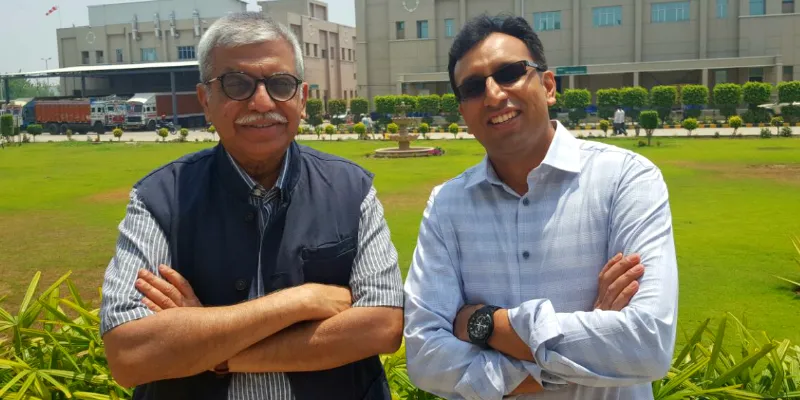No brainwave, no plunge – just a startup built over decades of research that now clocks Rs 1.5 Cr monthly
Most of the startup stories that make it to the front page depict an entrepreneur under the Bodhi tree having a vision or brainwave that presents itself in the form of an answer to a persistent question. However, on the other side of the mountain are the entrepreneurs who gather years, even decades, of intel on an issue, through observation, trial and error, and, in order to provide a solution that is current, state-of-the-art and right on the money. A certain employee at the traditional logistics firm Jayem Logistics, Puneet Prakash, has one such story of constant improvisation to share.
The engineer has been a logistics professional for the past 20 years. Not belonging to a family of entrepreneurs, his mentor was his previous boss and now his co-founder, R. Jayakumar, who ran a startup in 1986, when startup was an unheard-of concept. R. jayakumar had quit his job when he was 38 and built the large enterprise, Jayem Logistics, in 30 years; built eight others in the logistics domain, divested in three, and failed in one. Now, he is the prime investor and co-founder at City-Link.

‘Aha often leads to oho’
Puneet had worked with R. Jayakumar as a professional manager. Puneet says,
My learning was ‘to plug what can go wrong.’ I do not relate to my decision to start up as 'a plunge'. It does not make any difference to me whether I have a job or run a startup; my outlook was always entrepreneurial. Besides, I am not a person who goes by 'aha!' to start up and close down in another big 'oho!'.
The space was highly fragmented, with vehicle ownership not averaging more than 1- 1.5 vehicles, and even the largest fleet owners didn’t hold more than a few thousand vehicles. “We saw this as a big challenge on the enterprise side. On the demand side, we saw the hegemony of the stands - fixed-rate operations devoid of any rationale, which badly needed reform akin to the new-age taxis,” he explains.
The industry is fuelled by trust and cash transactions. The expenses in transportation, such as toll taxes and diesel are all paid in cash. So, there often is an air of suspicion around what drivers quote. Introducing transparency and accountability in the system to make the industry respectable was a key challenge. Moreover, with almost no online penetration, the demand-and-supply dynamic were often warped, due to a lack of reference points. Idling losses,occurring when cargo is shipped and the vehicle returns empty, are also substantial. Due to this chaotic state, the Government of India recognises transportation only as a ‘sector’ and not as an ‘industry,’ even though it constitutes about six percent of our GDP.
'We are no Ola or Uber'
Puneet thus saw the opportunity to build a defined marketplace for intra-city on-demand trucking. Rather than going the ‘I came, I saw and I conquered’ route, he used decades of domain expertise and was sure of himself when he decided to take the leap last September.
Puneet explains,
We are not the Ola or Uber for trucking. Our customers are mainly cargo guys, who are not at all savvy or intelligent. The solutions are like chalk and cheese, so we offered multiple booking channels - web, mobile, as well as a call centre to attend to queries. We aggregate supply and front-end execution with standard tariff plans. However, for both our offerings we complete the transaction on the platform, thereby ensuring a seamless experience for our customers.
How they do it
The enterprise business is more specific to customer requirements, and is governed by long-term contracts. Having a robust web platform, mobile app and call centre operations, with features like fare estimate,pricing intelligence and vendor rating, City Link aims to create value for anybody who moves cargo using trucks within the city. Hence the portfolios are diverse - large enterprises and small and medium-sized enterprises (SMEs), traders like timber merchants, glass merchants etc. and finally individuals.
“Reaching out to such a wide spectrum is a challenge. While we are making our presence felt in the digital world through search engine optimisation (SEO) and social media marketing (SMM) for our SME customers, we are also doing localised below-the-line (BTL) campaigns,” Puneet explains. Radio is another medium the company is considering.
'Top-line is vanity; bottom-line is sanity and cash-flow is reality'
This is the principal that the company followed through and through. “Vision and mission are overused expressions. What matters, in fact, are the right strategies, and the ability to execute with a clear focus on numbers. We always wanted to address the complete 'in city' requirements,” says Puneet.
These formulae have worked in the company's favour – it facilitates close to 9,000 trips monthly, and is clocking $3 million yearly.
In an industry valued at $85 billion, Mumbai-based startup Truckola, launched in August last year,also boasts of similar revenues. Corporate giant Mahindra entered the race with SmartShift, and so did Chennai’s old-timer Fast Track. Turant Delivery is another startup that has entered the fray, amongst others. Mahindra’s new-age extension is also being piloted in Mumbai, and will expand to 29 cities over a period of time.







